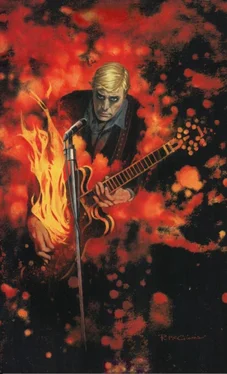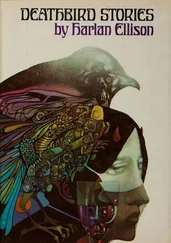She answered him with her eyes.
Shelly saw mist in her eyes. He was sure she would not cry. That wasn’t Ruth Kemp, however else she might debase herself before the boy her husband had befriended.
But she answered him with her eyes.
“Well, uh, you gotta excuse me.” He tried brushing past her, while the group watched, sensing something between the boy and the woman. “I—uh—, I’ve got this, uh, show to do off the fire ’scape, I said I, uh, told them I’d be—goddammit! Shelly, get her outta here!”
He tried to get past.
She did not move.
Shelly felt a hand on his sleeve and caught sight of Jean Friedel with a briefcase under her arm. She leaned toward him, whispering, “I came over with some papers for you to sign from the Colonel. What’s, what’s going on?”
Shelly nudged her quiet, and turned his attention back to Stag and Ruth Kemp.
She had not moved. The boy had backed up when she would not let him pass. Now he stood uncertainly, nervously, trying to gauge the texture of the situation, inherently aware he had to get away, but also aware of the emotional charge in the air.
“Luther, Asa passed on two days ago. He didn’t know what was going on too well toward the end, but he asked for you. He was all … all doped up by the doctors, Luther … but he asked me to come see you, to get you to … to…”
She turned away. He was staring at her as though she was speaking some incomprehensible dialect; he was not going to help her say it. She almost gave up. At the turning-instant, that quarter-beat in which decisions are made, she turned back.
“He died, Luther. He died, the kindest man I ever knew.” She was not hysterical, not even pleading; it was a deep pulling at each word to get the full meaning across. “My husband, Luther. He died of a broken heart, do you know that? He died of what everyone did to him; he was a good man and he never wanted to let people down, and that’s all anyone ever did to him. Let him down, don’t you see?”
Stag stared around the wings impatiently. “So what’s that got to do with me?”
“He asked me to come see you, Luther. He wanted you to sing the hymns at his service. He didn’t know what was going on most of the time—he was in so much pain they had him all doped up—but he said that to me when I saw him the—the last time … before…”
“Stag.” Shelly cut in firmly. “We can catch a late plane after the last show; I’ll talk to the Colonel, he’ll arrange with the theatre to fill in for a day, we can be back in time to—”
Stag waved him to silence. The Lord of the Manor waved his serf to silence. “We aren’t goin’ anywhere.” He looked straight at Ruth Kemp, and there was no more nervousness now. Up till this moment it had been inconvenience and an awkward situation. Now his position in life was being threatened, however momentarily. “Sorry, I’ve got a show to do. I’ve got a cont—”
“It was Asa’s last wish, Luther, that you sing.”
Stag Preston’s face lost its theatrical comfort. The naturally cruel set of the mouth reappeared, the hollows in the cheeks deepened. “ Pack it in . I’ve got a show to do. I don’t owe you a goddam thing; you and Asa had it from me, all you wanted when I was snot-poor. Now I’m out of all that. I ain’t, I’m not going back to it; not even for a day. So g’wan, blow! Beat it, split and let me work, will you?”
No one spoke. Jean Friedel’s hand tightened spasmodically on Shelly’s arm. Even the sound of The Palace, emptying and re-filling, faded back to surface noise, as though the scene itself was waiting, listening.
Ruth Kemp began speaking. It was a great boulder rumbling down a hill, beginning far off softly and louder and louder till it became an avalanche. It was a dynamo hurling itself to life, spinning sibilantly at first then whining at top point efficiency till the sound mounted up and up and glass shattered.
“Look at you. Look at what you are. You aren’t anything to be proud of. You think you’ve gotten away from being poor, because you wear silk clothes. But you’re lower than ever. You have no heart, no soul. Look around you, see these people? They’re as foul as you. They don’t care what you do as long as they can make the money. But we know you back home. We hear what you do.
“You’re an animal, Luther. You were always an animal, but we needed something to love, we wanted to be hurt, and you were always ready to hurt us. But you’re not human … you’re too selfish for that. You won’t live long … you can’t live long.
“God won’t allow it. He’ll find you out soon enough.”
She said more, but it wasn’t necessary. She belabored her point as those who live outside one-line put-down New York always do. But she had made her point.
She named him for all to see.
An abomination in the eyes of God and Man.
She stripped him of all the sham and glitter-pretense he wore onstage. He was, undeniably, an animal.
Ruth Kemp left, finally, without tears.
Tears in the dust of drained emotions.
Jean Friedel wanted to say something, now that they had left the theatre and were in the dim rear of the cocktail lounge. She wanted to say something pertinent, now that the steam-bath heat of backstage was gone and the air-conditioned stillness of the lounge surrounded them. She felt the need to declare herself in regard to what she had witnessed, now that Stag was somewhere else and her hand was wrapped around a martini. She wanted desperately to remove the sight of pain and loathing in Shelly’s eyes but she could not. With that peculiar insight women possess, she knew she should be still. Not a word. Not a sound. No confusion; no inserting herself as another factor in his thinking. It would only annoy him, infuriate him, muddle his thoughts. So she sat very quietly, smoking and sipping from her glass, realizing that for the first time Sheldon Morgenstern meant a very small something to her; he looked good to her; she wanted to do for him … something, anything that might clarify this attraction she felt. It was not love, she had no doubts about that—her declaration so long ago about their relationship still held—but there was a bond between them. The bond of two people who have glimpsed degradation and Hell together and who can reminisce about it. Not love, but something a lifetime deeper. Recognition. Empathy. The honest emotion of need and the unsullied desire to help. Jean Friedel felt more like a woman, less like a pornographically-oriented machine, than she had in a great while.
But she sat very still and watched, waiting for a flicker of light in Shelly’s face. A flicker that would signal his emergence from thoughts that even looked dark and swirling from where she sat, outside his mind. Cut off, but so aware of what he was doing inside himself that it was painful to her.
She sucked in her underlip and reached out with her mind for him. He was nowhere to be found. Out of touch, out of sight, out of mind, deep within himself.
What can do this to a man like him ? she thought. He’s not the kind who breaks up; he’s too much the laugher, too flip. But perhaps that’s the kind who hurt worst. What has he been going through with Stag to get this way … such hurt? Such very much hurt. What is he thinking ?
Thoughts:
Dear God, what have I done? What have we all done? I’m as bad as he is. I’ve lied for him; I’ve covered all his tracks … and for what, for what? So he could get bigger, too big to destroy. She was right, he isn’t human. No one with a heart could have turned her down, no matter how she’s bigoted. But she never hurt him … the both of them, she and Asa Kemp, all they ever gave him was affection and help. What sort of mentality has he got? What kind of mind turns down a request like that? Nothing can write it off; I can’t say he’s afraid to go back to poverty, because he’s beaten that already. It doesn’t figure. It’s like trying to figure the thought-processes of an infant, or a cat. It’s alien, terrible“what have I done?
Читать дальше












